International Business: China's Impact on Global Trade & Strategies
VerifiedAdded on 2023/04/08
|9
|2391
|466
Report
AI Summary
This report explores the implications of China's emergence as a global economic superpower on international business. It examines the impacts on the global trading system, highlighting increased state interference and shifts in trading patterns. The report also analyzes the effects on the global monetary system, including the rise of the Renminbi and the establishment of China-based financial institutions. Furthermore, it discusses how European and American corporations are adapting their business strategies, such as increasing operational capabilities in China, adopting localized approaches, and leveraging outsourcing opportunities. The analysis concludes that China's economic rise poses a direct threat to the dominance of the United States and necessitates a re-evaluation of global business strategies.
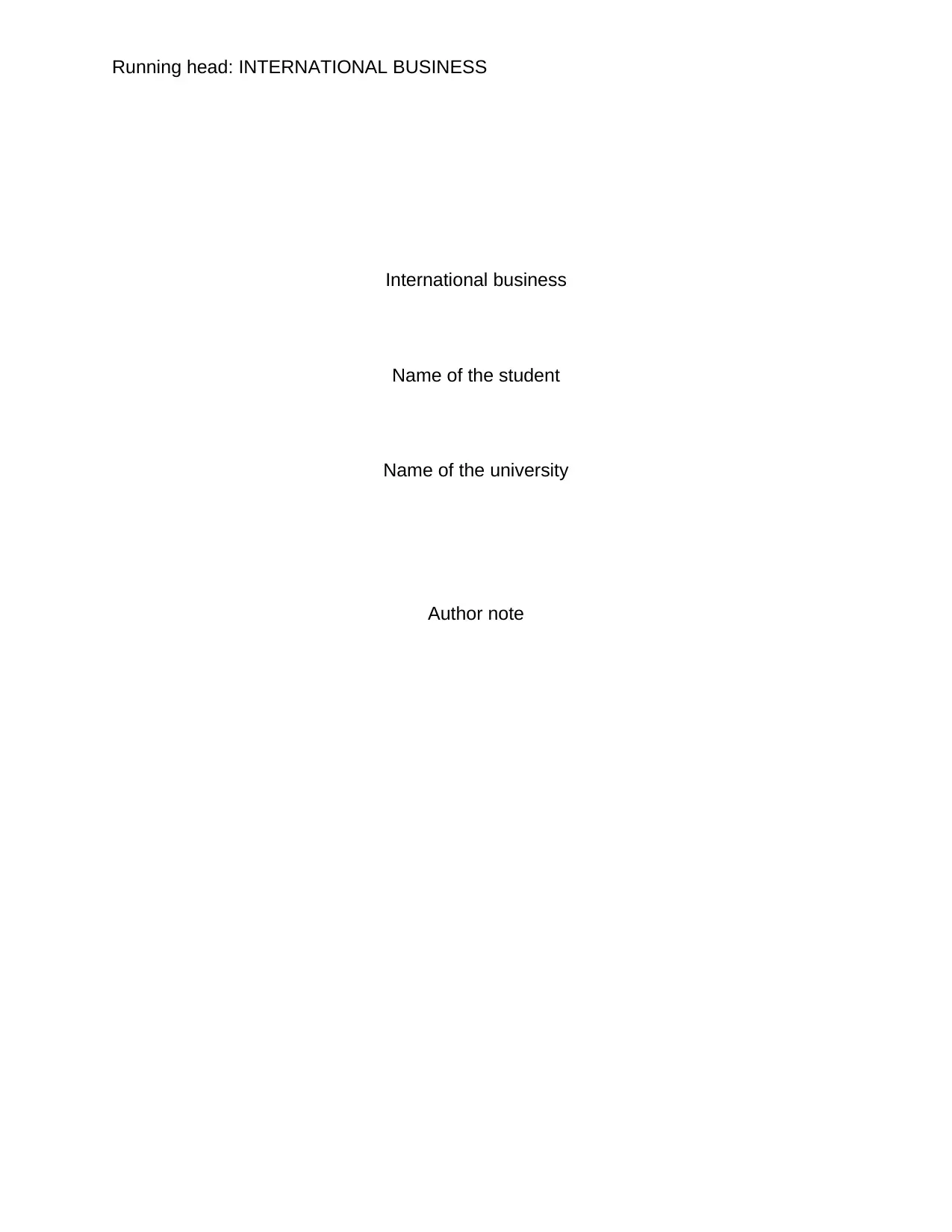
Running head: INTERNATIONAL BUSINESS
International business
Name of the student
Name of the university
Author note
International business
Name of the student
Name of the university
Author note
Paraphrase This Document
Need a fresh take? Get an instant paraphrase of this document with our AI Paraphraser
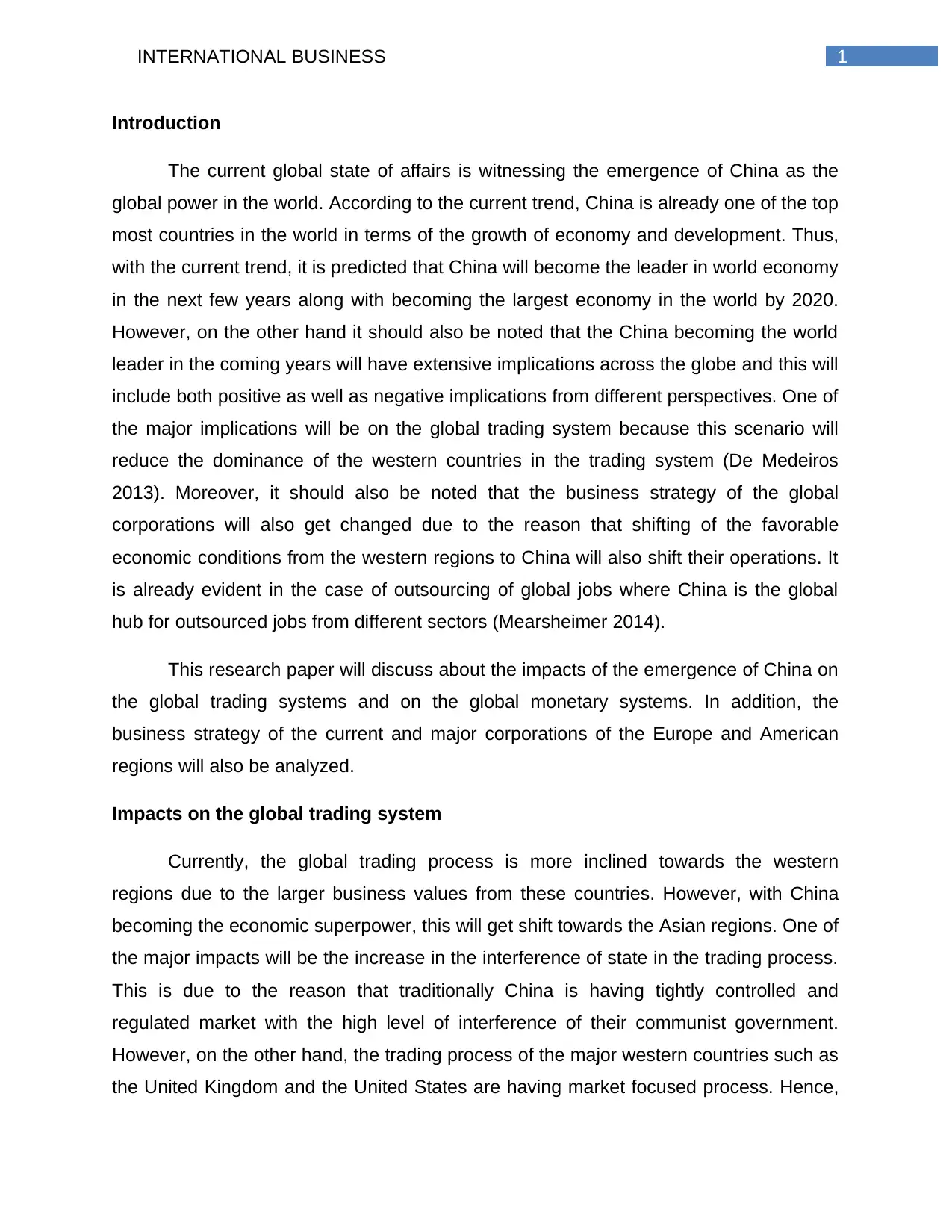
1INTERNATIONAL BUSINESS
Introduction
The current global state of affairs is witnessing the emergence of China as the
global power in the world. According to the current trend, China is already one of the top
most countries in the world in terms of the growth of economy and development. Thus,
with the current trend, it is predicted that China will become the leader in world economy
in the next few years along with becoming the largest economy in the world by 2020.
However, on the other hand it should also be noted that the China becoming the world
leader in the coming years will have extensive implications across the globe and this will
include both positive as well as negative implications from different perspectives. One of
the major implications will be on the global trading system because this scenario will
reduce the dominance of the western countries in the trading system (De Medeiros
2013). Moreover, it should also be noted that the business strategy of the global
corporations will also get changed due to the reason that shifting of the favorable
economic conditions from the western regions to China will also shift their operations. It
is already evident in the case of outsourcing of global jobs where China is the global
hub for outsourced jobs from different sectors (Mearsheimer 2014).
This research paper will discuss about the impacts of the emergence of China on
the global trading systems and on the global monetary systems. In addition, the
business strategy of the current and major corporations of the Europe and American
regions will also be analyzed.
Impacts on the global trading system
Currently, the global trading process is more inclined towards the western
regions due to the larger business values from these countries. However, with China
becoming the economic superpower, this will get shift towards the Asian regions. One of
the major impacts will be the increase in the interference of state in the trading process.
This is due to the reason that traditionally China is having tightly controlled and
regulated market with the high level of interference of their communist government.
However, on the other hand, the trading process of the major western countries such as
the United Kingdom and the United States are having market focused process. Hence,
Introduction
The current global state of affairs is witnessing the emergence of China as the
global power in the world. According to the current trend, China is already one of the top
most countries in the world in terms of the growth of economy and development. Thus,
with the current trend, it is predicted that China will become the leader in world economy
in the next few years along with becoming the largest economy in the world by 2020.
However, on the other hand it should also be noted that the China becoming the world
leader in the coming years will have extensive implications across the globe and this will
include both positive as well as negative implications from different perspectives. One of
the major implications will be on the global trading system because this scenario will
reduce the dominance of the western countries in the trading system (De Medeiros
2013). Moreover, it should also be noted that the business strategy of the global
corporations will also get changed due to the reason that shifting of the favorable
economic conditions from the western regions to China will also shift their operations. It
is already evident in the case of outsourcing of global jobs where China is the global
hub for outsourced jobs from different sectors (Mearsheimer 2014).
This research paper will discuss about the impacts of the emergence of China on
the global trading systems and on the global monetary systems. In addition, the
business strategy of the current and major corporations of the Europe and American
regions will also be analyzed.
Impacts on the global trading system
Currently, the global trading process is more inclined towards the western
regions due to the larger business values from these countries. However, with China
becoming the economic superpower, this will get shift towards the Asian regions. One of
the major impacts will be the increase in the interference of state in the trading process.
This is due to the reason that traditionally China is having tightly controlled and
regulated market with the high level of interference of their communist government.
However, on the other hand, the trading process of the major western countries such as
the United Kingdom and the United States are having market focused process. Hence,
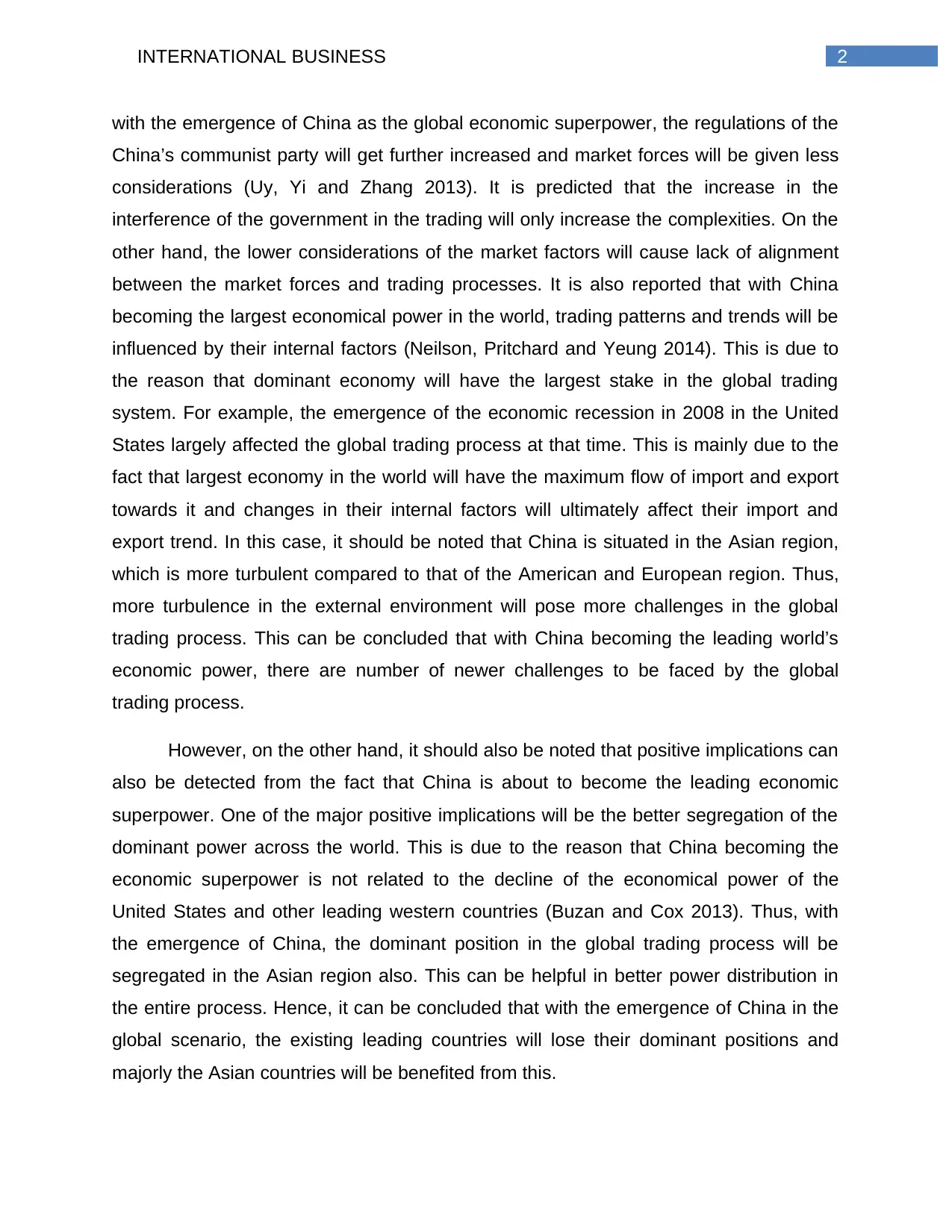
2INTERNATIONAL BUSINESS
with the emergence of China as the global economic superpower, the regulations of the
China’s communist party will get further increased and market forces will be given less
considerations (Uy, Yi and Zhang 2013). It is predicted that the increase in the
interference of the government in the trading will only increase the complexities. On the
other hand, the lower considerations of the market factors will cause lack of alignment
between the market forces and trading processes. It is also reported that with China
becoming the largest economical power in the world, trading patterns and trends will be
influenced by their internal factors (Neilson, Pritchard and Yeung 2014). This is due to
the reason that dominant economy will have the largest stake in the global trading
system. For example, the emergence of the economic recession in 2008 in the United
States largely affected the global trading process at that time. This is mainly due to the
fact that largest economy in the world will have the maximum flow of import and export
towards it and changes in their internal factors will ultimately affect their import and
export trend. In this case, it should be noted that China is situated in the Asian region,
which is more turbulent compared to that of the American and European region. Thus,
more turbulence in the external environment will pose more challenges in the global
trading process. This can be concluded that with China becoming the leading world’s
economic power, there are number of newer challenges to be faced by the global
trading process.
However, on the other hand, it should also be noted that positive implications can
also be detected from the fact that China is about to become the leading economic
superpower. One of the major positive implications will be the better segregation of the
dominant power across the world. This is due to the reason that China becoming the
economic superpower is not related to the decline of the economical power of the
United States and other leading western countries (Buzan and Cox 2013). Thus, with
the emergence of China, the dominant position in the global trading process will be
segregated in the Asian region also. This can be helpful in better power distribution in
the entire process. Hence, it can be concluded that with the emergence of China in the
global scenario, the existing leading countries will lose their dominant positions and
majorly the Asian countries will be benefited from this.
with the emergence of China as the global economic superpower, the regulations of the
China’s communist party will get further increased and market forces will be given less
considerations (Uy, Yi and Zhang 2013). It is predicted that the increase in the
interference of the government in the trading will only increase the complexities. On the
other hand, the lower considerations of the market factors will cause lack of alignment
between the market forces and trading processes. It is also reported that with China
becoming the largest economical power in the world, trading patterns and trends will be
influenced by their internal factors (Neilson, Pritchard and Yeung 2014). This is due to
the reason that dominant economy will have the largest stake in the global trading
system. For example, the emergence of the economic recession in 2008 in the United
States largely affected the global trading process at that time. This is mainly due to the
fact that largest economy in the world will have the maximum flow of import and export
towards it and changes in their internal factors will ultimately affect their import and
export trend. In this case, it should be noted that China is situated in the Asian region,
which is more turbulent compared to that of the American and European region. Thus,
more turbulence in the external environment will pose more challenges in the global
trading process. This can be concluded that with China becoming the leading world’s
economic power, there are number of newer challenges to be faced by the global
trading process.
However, on the other hand, it should also be noted that positive implications can
also be detected from the fact that China is about to become the leading economic
superpower. One of the major positive implications will be the better segregation of the
dominant power across the world. This is due to the reason that China becoming the
economic superpower is not related to the decline of the economical power of the
United States and other leading western countries (Buzan and Cox 2013). Thus, with
the emergence of China, the dominant position in the global trading process will be
segregated in the Asian region also. This can be helpful in better power distribution in
the entire process. Hence, it can be concluded that with the emergence of China in the
global scenario, the existing leading countries will lose their dominant positions and
majorly the Asian countries will be benefited from this.
⊘ This is a preview!⊘
Do you want full access?
Subscribe today to unlock all pages.

Trusted by 1+ million students worldwide
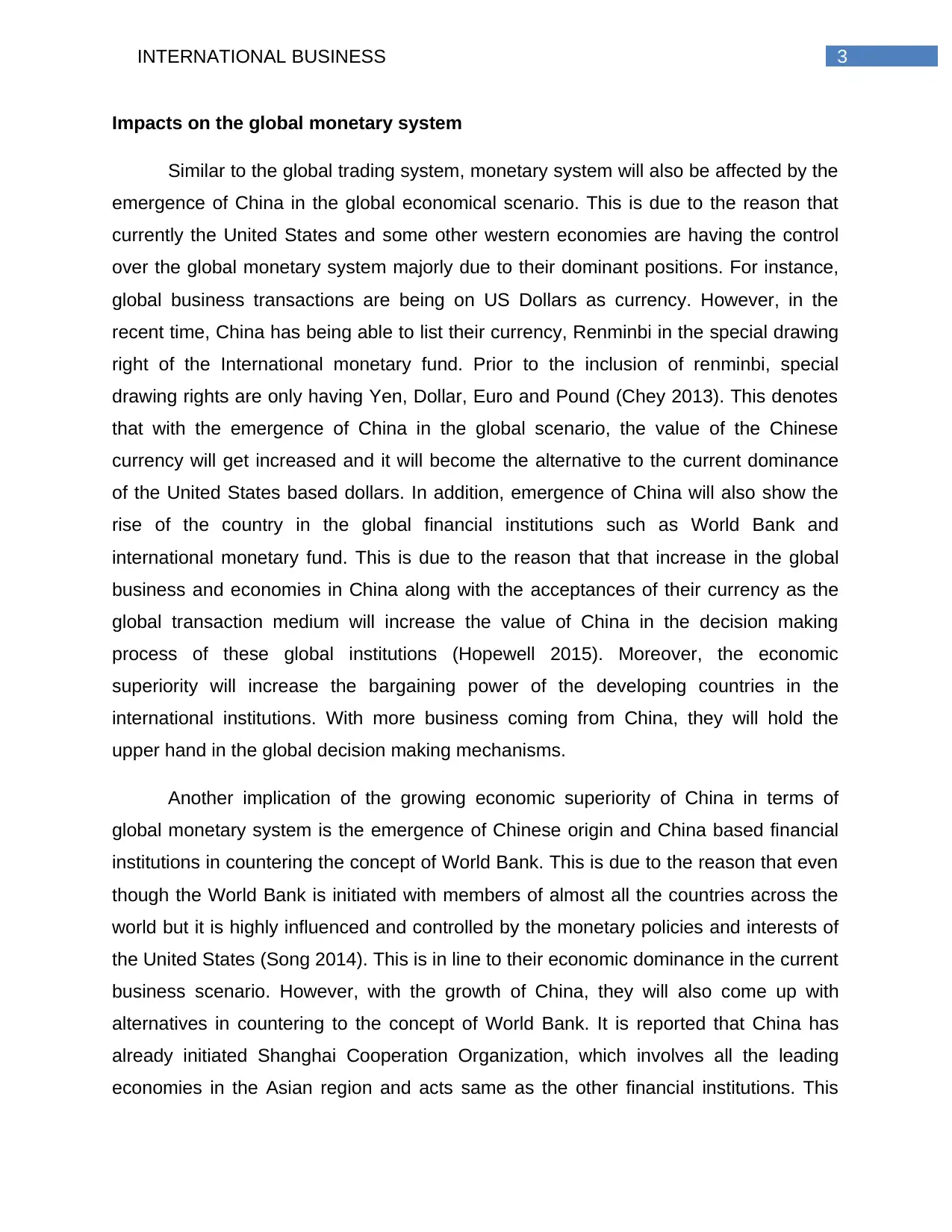
3INTERNATIONAL BUSINESS
Impacts on the global monetary system
Similar to the global trading system, monetary system will also be affected by the
emergence of China in the global economical scenario. This is due to the reason that
currently the United States and some other western economies are having the control
over the global monetary system majorly due to their dominant positions. For instance,
global business transactions are being on US Dollars as currency. However, in the
recent time, China has being able to list their currency, Renminbi in the special drawing
right of the International monetary fund. Prior to the inclusion of renminbi, special
drawing rights are only having Yen, Dollar, Euro and Pound (Chey 2013). This denotes
that with the emergence of China in the global scenario, the value of the Chinese
currency will get increased and it will become the alternative to the current dominance
of the United States based dollars. In addition, emergence of China will also show the
rise of the country in the global financial institutions such as World Bank and
international monetary fund. This is due to the reason that that increase in the global
business and economies in China along with the acceptances of their currency as the
global transaction medium will increase the value of China in the decision making
process of these global institutions (Hopewell 2015). Moreover, the economic
superiority will increase the bargaining power of the developing countries in the
international institutions. With more business coming from China, they will hold the
upper hand in the global decision making mechanisms.
Another implication of the growing economic superiority of China in terms of
global monetary system is the emergence of Chinese origin and China based financial
institutions in countering the concept of World Bank. This is due to the reason that even
though the World Bank is initiated with members of almost all the countries across the
world but it is highly influenced and controlled by the monetary policies and interests of
the United States (Song 2014). This is in line to their economic dominance in the current
business scenario. However, with the growth of China, they will also come up with
alternatives in countering to the concept of World Bank. It is reported that China has
already initiated Shanghai Cooperation Organization, which involves all the leading
economies in the Asian region and acts same as the other financial institutions. This
Impacts on the global monetary system
Similar to the global trading system, monetary system will also be affected by the
emergence of China in the global economical scenario. This is due to the reason that
currently the United States and some other western economies are having the control
over the global monetary system majorly due to their dominant positions. For instance,
global business transactions are being on US Dollars as currency. However, in the
recent time, China has being able to list their currency, Renminbi in the special drawing
right of the International monetary fund. Prior to the inclusion of renminbi, special
drawing rights are only having Yen, Dollar, Euro and Pound (Chey 2013). This denotes
that with the emergence of China in the global scenario, the value of the Chinese
currency will get increased and it will become the alternative to the current dominance
of the United States based dollars. In addition, emergence of China will also show the
rise of the country in the global financial institutions such as World Bank and
international monetary fund. This is due to the reason that that increase in the global
business and economies in China along with the acceptances of their currency as the
global transaction medium will increase the value of China in the decision making
process of these global institutions (Hopewell 2015). Moreover, the economic
superiority will increase the bargaining power of the developing countries in the
international institutions. With more business coming from China, they will hold the
upper hand in the global decision making mechanisms.
Another implication of the growing economic superiority of China in terms of
global monetary system is the emergence of Chinese origin and China based financial
institutions in countering the concept of World Bank. This is due to the reason that even
though the World Bank is initiated with members of almost all the countries across the
world but it is highly influenced and controlled by the monetary policies and interests of
the United States (Song 2014). This is in line to their economic dominance in the current
business scenario. However, with the growth of China, they will also come up with
alternatives in countering to the concept of World Bank. It is reported that China has
already initiated Shanghai Cooperation Organization, which involves all the leading
economies in the Asian region and acts same as the other financial institutions. This
Paraphrase This Document
Need a fresh take? Get an instant paraphrase of this document with our AI Paraphraser
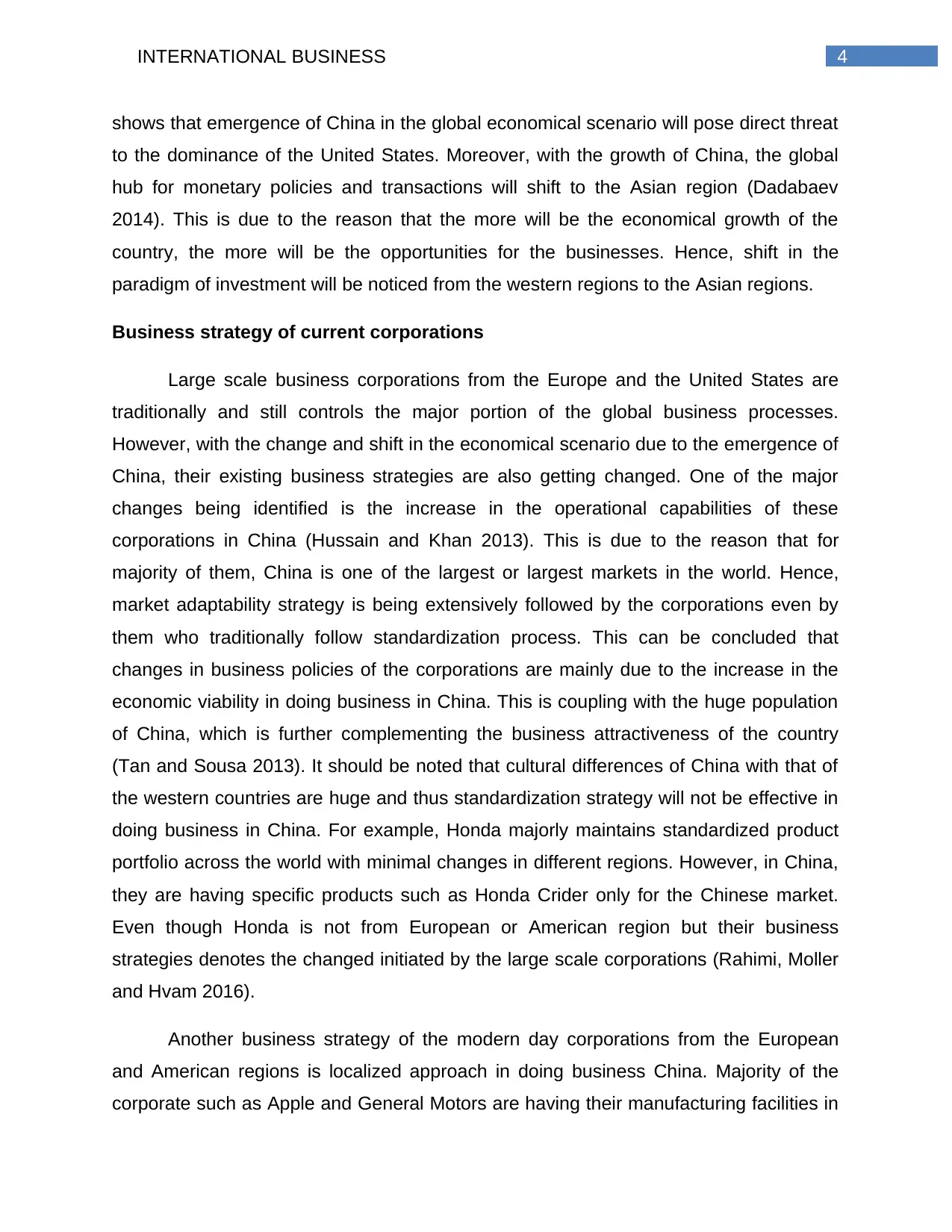
4INTERNATIONAL BUSINESS
shows that emergence of China in the global economical scenario will pose direct threat
to the dominance of the United States. Moreover, with the growth of China, the global
hub for monetary policies and transactions will shift to the Asian region (Dadabaev
2014). This is due to the reason that the more will be the economical growth of the
country, the more will be the opportunities for the businesses. Hence, shift in the
paradigm of investment will be noticed from the western regions to the Asian regions.
Business strategy of current corporations
Large scale business corporations from the Europe and the United States are
traditionally and still controls the major portion of the global business processes.
However, with the change and shift in the economical scenario due to the emergence of
China, their existing business strategies are also getting changed. One of the major
changes being identified is the increase in the operational capabilities of these
corporations in China (Hussain and Khan 2013). This is due to the reason that for
majority of them, China is one of the largest or largest markets in the world. Hence,
market adaptability strategy is being extensively followed by the corporations even by
them who traditionally follow standardization process. This can be concluded that
changes in business policies of the corporations are mainly due to the increase in the
economic viability in doing business in China. This is coupling with the huge population
of China, which is further complementing the business attractiveness of the country
(Tan and Sousa 2013). It should be noted that cultural differences of China with that of
the western countries are huge and thus standardization strategy will not be effective in
doing business in China. For example, Honda majorly maintains standardized product
portfolio across the world with minimal changes in different regions. However, in China,
they are having specific products such as Honda Crider only for the Chinese market.
Even though Honda is not from European or American region but their business
strategies denotes the changed initiated by the large scale corporations (Rahimi, Moller
and Hvam 2016).
Another business strategy of the modern day corporations from the European
and American regions is localized approach in doing business China. Majority of the
corporate such as Apple and General Motors are having their manufacturing facilities in
shows that emergence of China in the global economical scenario will pose direct threat
to the dominance of the United States. Moreover, with the growth of China, the global
hub for monetary policies and transactions will shift to the Asian region (Dadabaev
2014). This is due to the reason that the more will be the economical growth of the
country, the more will be the opportunities for the businesses. Hence, shift in the
paradigm of investment will be noticed from the western regions to the Asian regions.
Business strategy of current corporations
Large scale business corporations from the Europe and the United States are
traditionally and still controls the major portion of the global business processes.
However, with the change and shift in the economical scenario due to the emergence of
China, their existing business strategies are also getting changed. One of the major
changes being identified is the increase in the operational capabilities of these
corporations in China (Hussain and Khan 2013). This is due to the reason that for
majority of them, China is one of the largest or largest markets in the world. Hence,
market adaptability strategy is being extensively followed by the corporations even by
them who traditionally follow standardization process. This can be concluded that
changes in business policies of the corporations are mainly due to the increase in the
economic viability in doing business in China. This is coupling with the huge population
of China, which is further complementing the business attractiveness of the country
(Tan and Sousa 2013). It should be noted that cultural differences of China with that of
the western countries are huge and thus standardization strategy will not be effective in
doing business in China. For example, Honda majorly maintains standardized product
portfolio across the world with minimal changes in different regions. However, in China,
they are having specific products such as Honda Crider only for the Chinese market.
Even though Honda is not from European or American region but their business
strategies denotes the changed initiated by the large scale corporations (Rahimi, Moller
and Hvam 2016).
Another business strategy of the modern day corporations from the European
and American regions is localized approach in doing business China. Majority of the
corporate such as Apple and General Motors are having their manufacturing facilities in
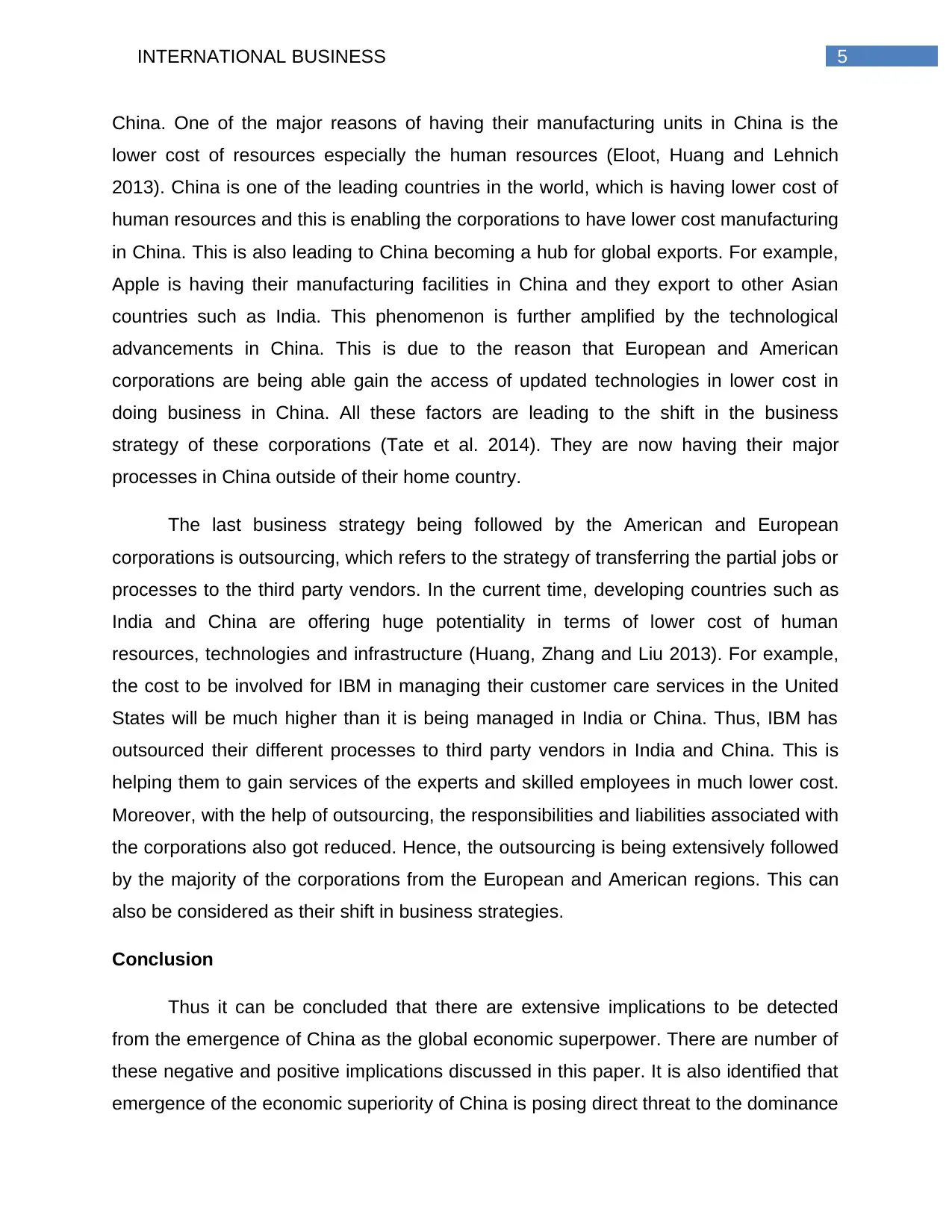
5INTERNATIONAL BUSINESS
China. One of the major reasons of having their manufacturing units in China is the
lower cost of resources especially the human resources (Eloot, Huang and Lehnich
2013). China is one of the leading countries in the world, which is having lower cost of
human resources and this is enabling the corporations to have lower cost manufacturing
in China. This is also leading to China becoming a hub for global exports. For example,
Apple is having their manufacturing facilities in China and they export to other Asian
countries such as India. This phenomenon is further amplified by the technological
advancements in China. This is due to the reason that European and American
corporations are being able gain the access of updated technologies in lower cost in
doing business in China. All these factors are leading to the shift in the business
strategy of these corporations (Tate et al. 2014). They are now having their major
processes in China outside of their home country.
The last business strategy being followed by the American and European
corporations is outsourcing, which refers to the strategy of transferring the partial jobs or
processes to the third party vendors. In the current time, developing countries such as
India and China are offering huge potentiality in terms of lower cost of human
resources, technologies and infrastructure (Huang, Zhang and Liu 2013). For example,
the cost to be involved for IBM in managing their customer care services in the United
States will be much higher than it is being managed in India or China. Thus, IBM has
outsourced their different processes to third party vendors in India and China. This is
helping them to gain services of the experts and skilled employees in much lower cost.
Moreover, with the help of outsourcing, the responsibilities and liabilities associated with
the corporations also got reduced. Hence, the outsourcing is being extensively followed
by the majority of the corporations from the European and American regions. This can
also be considered as their shift in business strategies.
Conclusion
Thus it can be concluded that there are extensive implications to be detected
from the emergence of China as the global economic superpower. There are number of
these negative and positive implications discussed in this paper. It is also identified that
emergence of the economic superiority of China is posing direct threat to the dominance
China. One of the major reasons of having their manufacturing units in China is the
lower cost of resources especially the human resources (Eloot, Huang and Lehnich
2013). China is one of the leading countries in the world, which is having lower cost of
human resources and this is enabling the corporations to have lower cost manufacturing
in China. This is also leading to China becoming a hub for global exports. For example,
Apple is having their manufacturing facilities in China and they export to other Asian
countries such as India. This phenomenon is further amplified by the technological
advancements in China. This is due to the reason that European and American
corporations are being able gain the access of updated technologies in lower cost in
doing business in China. All these factors are leading to the shift in the business
strategy of these corporations (Tate et al. 2014). They are now having their major
processes in China outside of their home country.
The last business strategy being followed by the American and European
corporations is outsourcing, which refers to the strategy of transferring the partial jobs or
processes to the third party vendors. In the current time, developing countries such as
India and China are offering huge potentiality in terms of lower cost of human
resources, technologies and infrastructure (Huang, Zhang and Liu 2013). For example,
the cost to be involved for IBM in managing their customer care services in the United
States will be much higher than it is being managed in India or China. Thus, IBM has
outsourced their different processes to third party vendors in India and China. This is
helping them to gain services of the experts and skilled employees in much lower cost.
Moreover, with the help of outsourcing, the responsibilities and liabilities associated with
the corporations also got reduced. Hence, the outsourcing is being extensively followed
by the majority of the corporations from the European and American regions. This can
also be considered as their shift in business strategies.
Conclusion
Thus it can be concluded that there are extensive implications to be detected
from the emergence of China as the global economic superpower. There are number of
these negative and positive implications discussed in this paper. It is also identified that
emergence of the economic superiority of China is posing direct threat to the dominance
⊘ This is a preview!⊘
Do you want full access?
Subscribe today to unlock all pages.

Trusted by 1+ million students worldwide
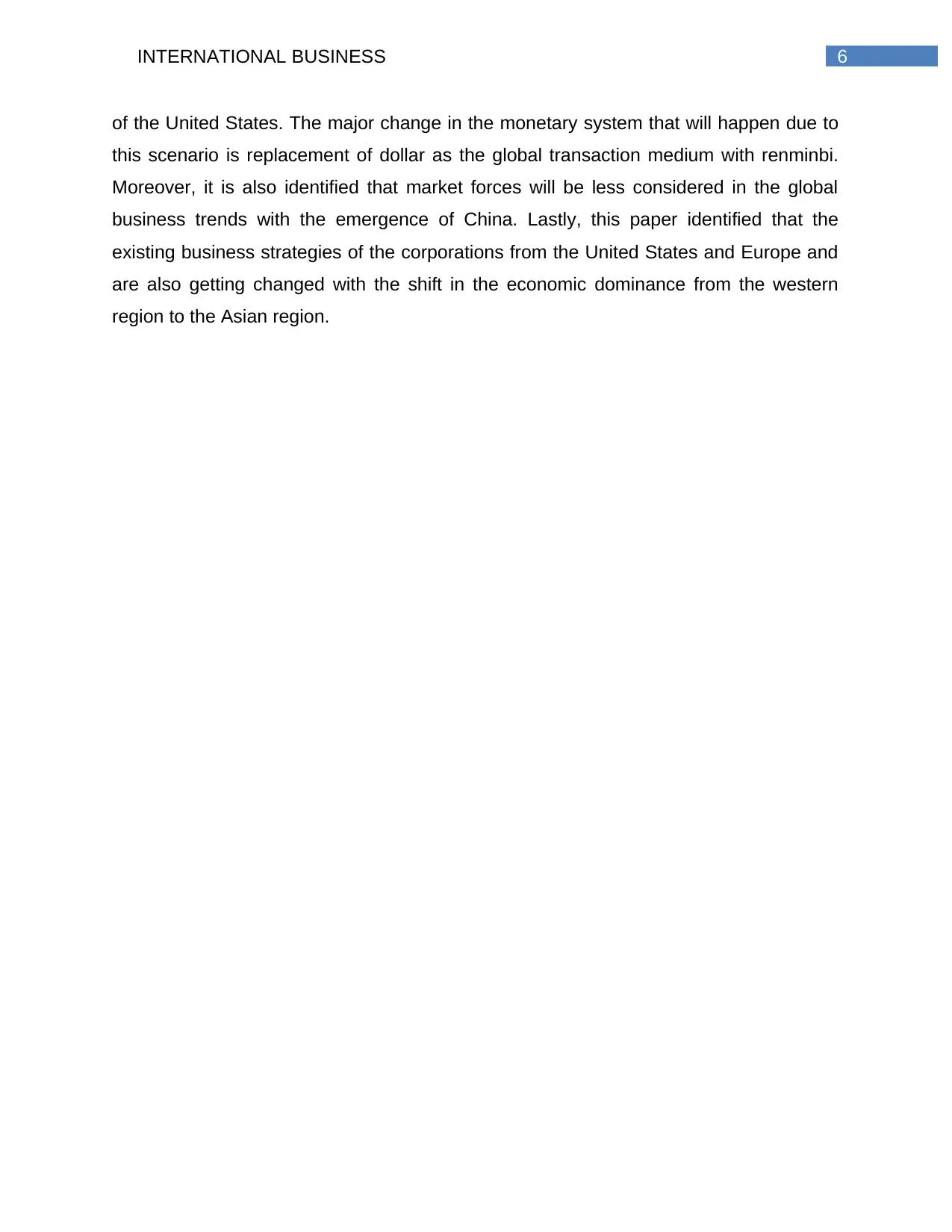
6INTERNATIONAL BUSINESS
of the United States. The major change in the monetary system that will happen due to
this scenario is replacement of dollar as the global transaction medium with renminbi.
Moreover, it is also identified that market forces will be less considered in the global
business trends with the emergence of China. Lastly, this paper identified that the
existing business strategies of the corporations from the United States and Europe and
are also getting changed with the shift in the economic dominance from the western
region to the Asian region.
of the United States. The major change in the monetary system that will happen due to
this scenario is replacement of dollar as the global transaction medium with renminbi.
Moreover, it is also identified that market forces will be less considered in the global
business trends with the emergence of China. Lastly, this paper identified that the
existing business strategies of the corporations from the United States and Europe and
are also getting changed with the shift in the economic dominance from the western
region to the Asian region.
Paraphrase This Document
Need a fresh take? Get an instant paraphrase of this document with our AI Paraphraser
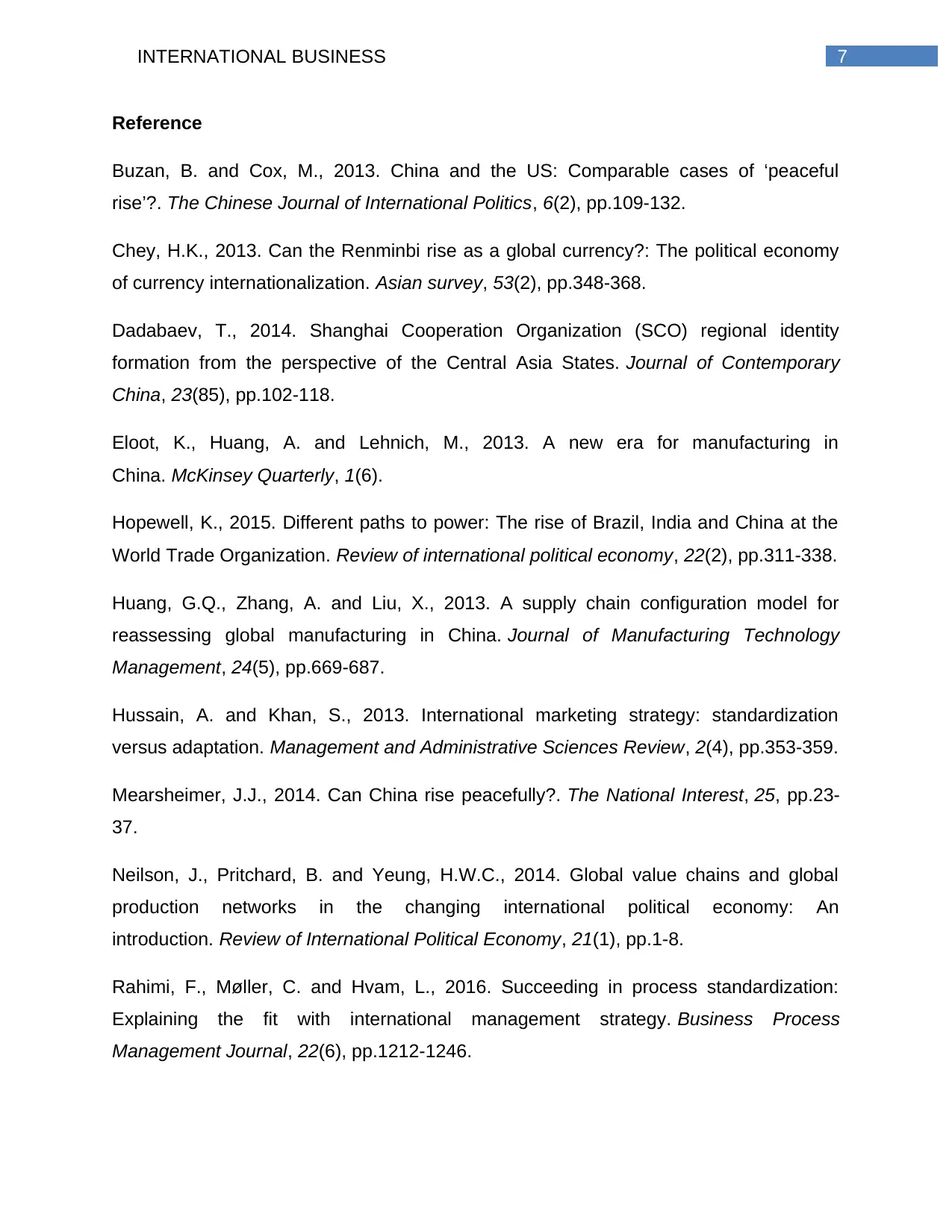
7INTERNATIONAL BUSINESS
Reference
Buzan, B. and Cox, M., 2013. China and the US: Comparable cases of ‘peaceful
rise’?. The Chinese Journal of International Politics, 6(2), pp.109-132.
Chey, H.K., 2013. Can the Renminbi rise as a global currency?: The political economy
of currency internationalization. Asian survey, 53(2), pp.348-368.
Dadabaev, T., 2014. Shanghai Cooperation Organization (SCO) regional identity
formation from the perspective of the Central Asia States. Journal of Contemporary
China, 23(85), pp.102-118.
Eloot, K., Huang, A. and Lehnich, M., 2013. A new era for manufacturing in
China. McKinsey Quarterly, 1(6).
Hopewell, K., 2015. Different paths to power: The rise of Brazil, India and China at the
World Trade Organization. Review of international political economy, 22(2), pp.311-338.
Huang, G.Q., Zhang, A. and Liu, X., 2013. A supply chain configuration model for
reassessing global manufacturing in China. Journal of Manufacturing Technology
Management, 24(5), pp.669-687.
Hussain, A. and Khan, S., 2013. International marketing strategy: standardization
versus adaptation. Management and Administrative Sciences Review, 2(4), pp.353-359.
Mearsheimer, J.J., 2014. Can China rise peacefully?. The National Interest, 25, pp.23-
37.
Neilson, J., Pritchard, B. and Yeung, H.W.C., 2014. Global value chains and global
production networks in the changing international political economy: An
introduction. Review of International Political Economy, 21(1), pp.1-8.
Rahimi, F., Møller, C. and Hvam, L., 2016. Succeeding in process standardization:
Explaining the fit with international management strategy. Business Process
Management Journal, 22(6), pp.1212-1246.
Reference
Buzan, B. and Cox, M., 2013. China and the US: Comparable cases of ‘peaceful
rise’?. The Chinese Journal of International Politics, 6(2), pp.109-132.
Chey, H.K., 2013. Can the Renminbi rise as a global currency?: The political economy
of currency internationalization. Asian survey, 53(2), pp.348-368.
Dadabaev, T., 2014. Shanghai Cooperation Organization (SCO) regional identity
formation from the perspective of the Central Asia States. Journal of Contemporary
China, 23(85), pp.102-118.
Eloot, K., Huang, A. and Lehnich, M., 2013. A new era for manufacturing in
China. McKinsey Quarterly, 1(6).
Hopewell, K., 2015. Different paths to power: The rise of Brazil, India and China at the
World Trade Organization. Review of international political economy, 22(2), pp.311-338.
Huang, G.Q., Zhang, A. and Liu, X., 2013. A supply chain configuration model for
reassessing global manufacturing in China. Journal of Manufacturing Technology
Management, 24(5), pp.669-687.
Hussain, A. and Khan, S., 2013. International marketing strategy: standardization
versus adaptation. Management and Administrative Sciences Review, 2(4), pp.353-359.
Mearsheimer, J.J., 2014. Can China rise peacefully?. The National Interest, 25, pp.23-
37.
Neilson, J., Pritchard, B. and Yeung, H.W.C., 2014. Global value chains and global
production networks in the changing international political economy: An
introduction. Review of International Political Economy, 21(1), pp.1-8.
Rahimi, F., Møller, C. and Hvam, L., 2016. Succeeding in process standardization:
Explaining the fit with international management strategy. Business Process
Management Journal, 22(6), pp.1212-1246.
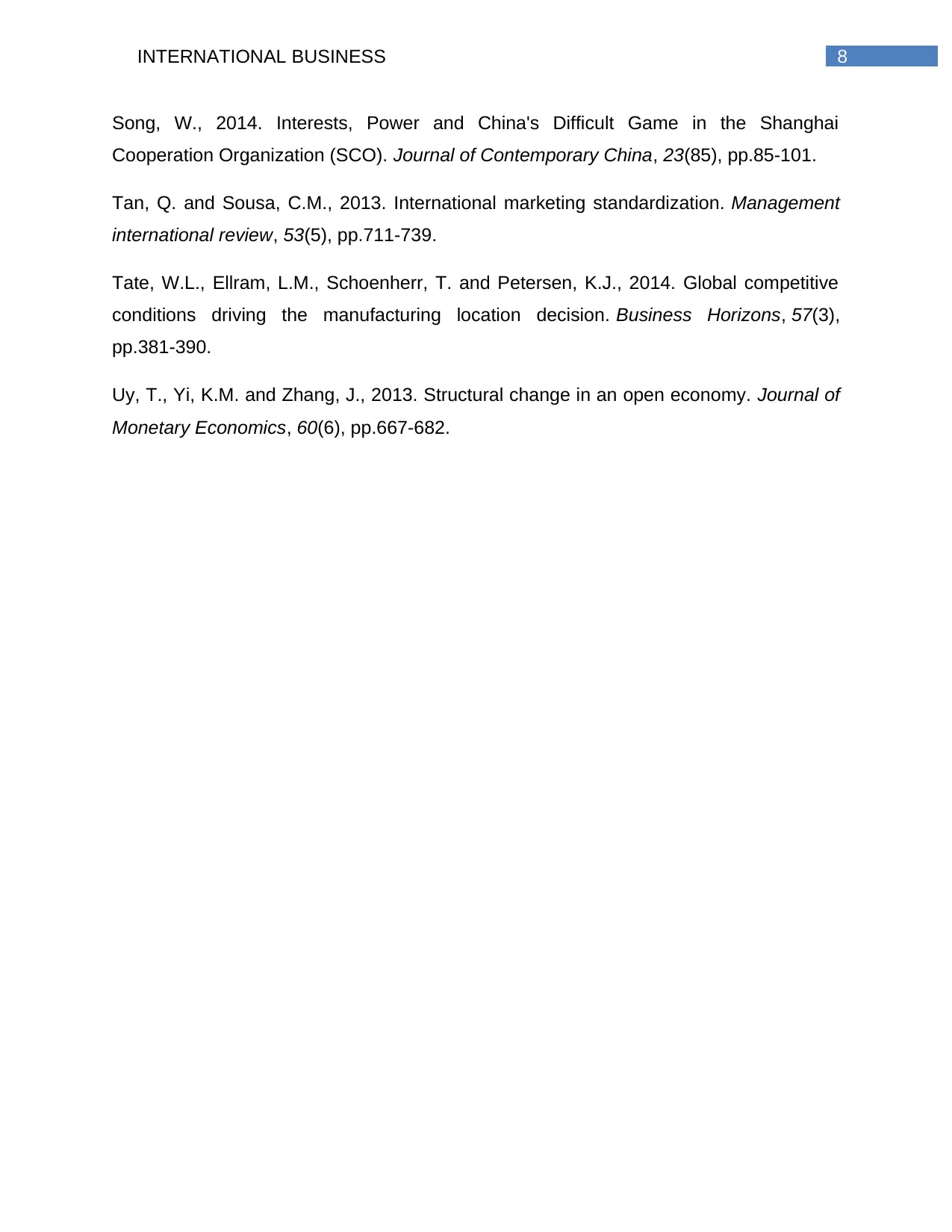
8INTERNATIONAL BUSINESS
Song, W., 2014. Interests, Power and China's Difficult Game in the Shanghai
Cooperation Organization (SCO). Journal of Contemporary China, 23(85), pp.85-101.
Tan, Q. and Sousa, C.M., 2013. International marketing standardization. Management
international review, 53(5), pp.711-739.
Tate, W.L., Ellram, L.M., Schoenherr, T. and Petersen, K.J., 2014. Global competitive
conditions driving the manufacturing location decision. Business Horizons, 57(3),
pp.381-390.
Uy, T., Yi, K.M. and Zhang, J., 2013. Structural change in an open economy. Journal of
Monetary Economics, 60(6), pp.667-682.
Song, W., 2014. Interests, Power and China's Difficult Game in the Shanghai
Cooperation Organization (SCO). Journal of Contemporary China, 23(85), pp.85-101.
Tan, Q. and Sousa, C.M., 2013. International marketing standardization. Management
international review, 53(5), pp.711-739.
Tate, W.L., Ellram, L.M., Schoenherr, T. and Petersen, K.J., 2014. Global competitive
conditions driving the manufacturing location decision. Business Horizons, 57(3),
pp.381-390.
Uy, T., Yi, K.M. and Zhang, J., 2013. Structural change in an open economy. Journal of
Monetary Economics, 60(6), pp.667-682.
⊘ This is a preview!⊘
Do you want full access?
Subscribe today to unlock all pages.

Trusted by 1+ million students worldwide
1 out of 9
Related Documents
Your All-in-One AI-Powered Toolkit for Academic Success.
+13062052269
info@desklib.com
Available 24*7 on WhatsApp / Email
![[object Object]](/_next/static/media/star-bottom.7253800d.svg)
Unlock your academic potential
Copyright © 2020–2026 A2Z Services. All Rights Reserved. Developed and managed by ZUCOL.




